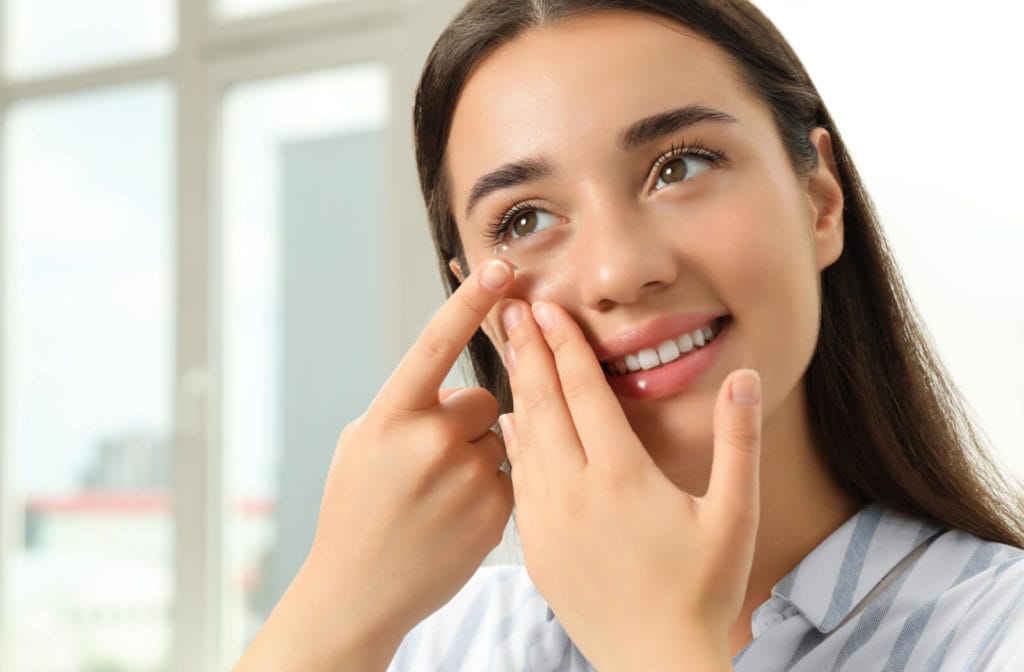Contact lenses are extremely popular among people with vision problems. They’re comfortable, versatile, and make it easier to navigate your day. With contact lenses, you can see clearly without worrying about damaging your glasses. But how long do contact lenses last?
It depends on the type of lens. There are daily lenses, which you’ll want to discard at the end of each day. Then, there are bi-weekly, monthly lenses, and more. If you’re ever unsure of when to replace your lenses, don’t hesitate to reach out to your optometrist.
The Different Types of Contacts
When it comes to contact lenses, there’s good news: there’s an expiration date clearly printed on the outside of the box. You should never wear your contacts past this date, as the seal on the storage case and the cleaning solution may not be airtight anymore. If you continue wearing the lenses past the expiration date, you’re more likely to experience an eye infection and other potential problems.
The most common types of contacts are:
- Daily disposables
- Bi-weekly
- Monthly
Each of these will have their own expiration date. But the expiration isn’t the only thing that sets contacts apart from each other—the materials also matter.
There are rigid gas-permeable lenses that tend to last longer but may be more uncomfortable if you aren’t used to wearing them. Soft lenses are made of silicon hydrogel, which are much more comfortable but usually don’t last as long as sturdier materials.
And then there are hybrid lenses, which incorporate a harder center of the lens with a softer outside to give the best of both worlds. But it doesn’t stop here—there’s an entire world of specialty contacts to consider!
What Are Specialty Contacts?
Specialty contacts are similar to standard lenses, but each is designed to address a different problem. Some are designed to counter presbyopia, while others help misshapen eyes focus light properly. Here at ERC Optometry, we usually recommend:
- Toric lenses for astigmatism. These have different powers in different sections of the lenses, as well as a unique shape to counteract astigmatism.
- Multifocal lenses are ideal for presbyopia. These have different viewing zones for different distances. The zones blend seamlessly into one another.
- Scleral lenses are ideal for people with irregularly shaped corneas. These are larger than traditional contacts and rest on the whites of your eyes (the sclera).
- Hybrid lenses incorporate rigid and soft materials to provide a long-lasting and comfortable answer to contacts.
- Orthokeratology is for the temporary reshaping of the cornea. These specialty lenses are worn overnight to give you clear vision once the lenses are removed.
Each specialty lens can be a wonderful answer to different vision problems. But they aren’t a one-size-fits-all approach and aren’t interchangeable solutions. To find out what lens would help your unique vision problems, you’ll need to see your optometrist about a contact lens fitting.
What Is a Contact Lens Fitting?
Every person’s eyes are different. This means that to get the right pair of contacts, you’ll need a pair designed for your unique needs. During a contact lens fitting, your optometrist uses a corneal topography device—a machine that takes a digital scan of the measurements of your eye. They’ll check:
- Your eye’s curvature, diameter, and shape
- The health of your tear film
- Whether or not you have any irregularities that could affect a lens
Then, they’ll be able to find a custom lens to meet your needs. They’ll consider any eye conditions you already have, so you’ll have a unique lens that gives you the vision you deserve—without discomfort or irritation.
The Benefits of Contacts
Contact lenses have an excellent edge over glasses. You don’t have to worry about frames getting in the way, and they don’t fog up in cold weather or get soaked in the rain. And even better, they don’t interfere with your daily activities.
So, if you like to spend your weekends playing sports or working in an area where your glasses can get damaged, contacts might just be your solution. You don’t need to be concerned that they’ll break or get damaged in any way, and they won’t get knocked off your face.
But to keep your vision clear, you’ll have to learn how to care for your contacts properly.
Properly Caring for Your Contacts
Fortunately, caring for your contacts is relatively simple. It can help to:
- Always wash your hands thoroughly before touching contact lenses or your eyes
- Disinfect the lenses once you remove them
- Store the lenses in a clean and disinfected case
- Never sleep, shower, or swim with your contacts in
- Never use out-of-date lenses, storage cases, or cleaning solution
Following these care tips can help you keep your contacts sterile and safe. It lowers your chance of developing an eye infection and other potential problems, so it’s always a good idea to take the time to sterilize and store your contacts properly.

Should I Try Contacts?
If you need to replace your contacts, buy a new pair, or simply want to learn more, visit our ERC Optometry team. Our team is here to give you a proper fitting, and we can explain more about the different types of contacts. You deserve clear vision, so book an appointment with us today!

